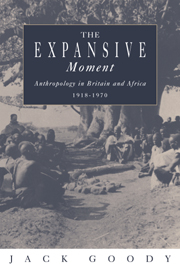Book contents
- Frontmatter
- Contents
- Introduction
- 1 The economic and organisational basis of British social anthropology in its formative period, 1930–1939: social reform in the colonies
- 2 Training for the field: the sorcerer's apprentices
- 3 Making it to the field as a Jew and a Red
- 4 Personal and intellectual friendships: Fortes and Evans-Pritchard
- 5 Personal and intellectual animosities: Evans-Pritchard, Malinowski and others
- 6 The Oxford Group
- 7 Some achievements of anthropology in Africa
- 8 Personal contributions
- 9 Concluding remarks
- Appendix 1 Changing research schemes
- Appendix 2 Towards the study of the history of social anthropology
- Notes
- List of references
- Index
Introduction
Published online by Cambridge University Press: 30 September 2009
- Frontmatter
- Contents
- Introduction
- 1 The economic and organisational basis of British social anthropology in its formative period, 1930–1939: social reform in the colonies
- 2 Training for the field: the sorcerer's apprentices
- 3 Making it to the field as a Jew and a Red
- 4 Personal and intellectual friendships: Fortes and Evans-Pritchard
- 5 Personal and intellectual animosities: Evans-Pritchard, Malinowski and others
- 6 The Oxford Group
- 7 Some achievements of anthropology in Africa
- 8 Personal contributions
- 9 Concluding remarks
- Appendix 1 Changing research schemes
- Appendix 2 Towards the study of the history of social anthropology
- Notes
- List of references
- Index
Summary
Why would one want to read or write a book about a small group of academics, whose fate might interest only practitioners in the same field? Partly because it illustrates the growth and expansion of an area of enquiry and University teaching and research which has had some influence on neighbouring fields. Partly because the accounts which are emerging of that group seem to overlook some crucial aspects of the social and intellectual situation of the 1930s and post-war period. Following an approach current in much intellectual, sociological and cultural history, they assume a homogeneity of interest between intellectuals and the government which neglects internal contradictions and oppositions. Equally intellectual positions were more differentiated, more argued about than such approaches allow, often holding within themselves the clues to the next development. That seems true not only within the group of scholars involved but also of their sponsors, whether these were foundations or governments. In looking at this situation I hope to throw light on the discussion about the relationships of these scholars to the powers that be, which I see as much more differentiated, less homogeneous, than some recent commentators.
As a professional field of enquiry, social anthropology emerged at the beginning of the twentieth century, though it had many earlier progenitors. This book presents an account of the period when this subject came of age in Britain, largely under the auspices of Bronislaw Malinowski, the Polish professor teaching at the London School of Economics (LSE).
- Type
- Chapter
- Information
- The Expansive MomentThe rise of Social Anthropology in Britain and Africa 1918–1970, pp. 1 - 6Publisher: Cambridge University PressPrint publication year: 1995

